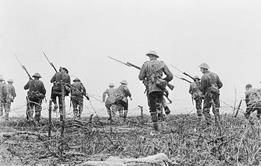The fates of gentlemen admitted as solicitors 100 years ago make fascinating reading.
Despite Gwyneth Bebb’s heroic campaign for women to be recognised as persons within the meaning of the Solicitors Act 1843, the Gazette of a century ago recorded the tidings of an all-male profession. Each edition published a ‘List of Gentlemen applying to be admitted as Solicitors of the Supreme Court’.
August was always a light month, so only 17 appeared on the last list before the outbreak of war.
As they posed in their robes at the Law Society’s Hall, the 17 gentlemen could not have guessed that within a year or so more than half would be soldiers – and of those more than half would become casualties of the Great War.
Matching the names of the class of August 1914 against those in the Society’s record of military service of solicitors and articled clerks makes fascinating, and poignant, reading. The record of service is not necessarily comprehensive because it relies on details submitted voluntarily, but it records that of the 17, nine were to serve in the British Army.
The first to join up was Eric Davies, articled to Henry Cooke, 1 Copthall Buildings, London (later Bristows, Cooke and Carpmael). On the day war broke out, 4 August 1914, he was mobilised as a second lieutenant in the Notts (Sherwood Rangers) Yeomanry. He was in uniform for five years, serving mainly as a captain in Gallipoli, Egypt, Salonica and Palestine. He was twice wounded – at Gallipoli in 1915 and Palestine in 1917.
As ‘gentlemen’ the majority of solicitor-soldiers served as officers, typically in the new battalions raised by Lord Kitchener’s iconic recruiting campaign. John William Arthur Earle joined the Irish Guards as a second lieutenant in December 1915, was promoted to lieutenant and acting captain, and appears to have come through unscathed.
Likewise Leonard Arthur de Lacey Meredith, of George Godfrey Warr, Castle Street, Liverpool, who served as a second lieutenant in the Gloucestershire Regiment.
Glendower Jones, of G.H. Hindley, Liverpool, was apparently content to serve as a private in the Manchester Regiment. He survived. But Harry Oliver Selway, who enlisted as a private in the Worcestershire Regiment before getting his Lance-Corporal stripe, died in hospital in Wimereux on 9 December 1915, aged 24.
Percy Bertram Boyd Oldfield, of H.R. Oldfield, 13 Walbrook, London EC, answered the call in 1915, joining the London Rifle Brigade as a second lieutenant, serving to 1919 with the rank of Captain. Like so many others, he was wounded on the first day of the Battle of the Somme, on 1 July 1916.
David Arnott Williamson, articled to John Arnot Williamson of Newcastle upon Tyne, made an interesting career switch, serving with the second Tyne Electrical Engineers with the rank of Captain.
For high-flyers in the profession, a typical route into the forces was via the Inns of Court officers’ training corps (OTC) and a commission in an infantry regiment. So it was for Gerard Peters, a clerk with Collyer, Bristow & Co of 4 Bedford Row.
The vicar’s son from York had graduated Honours Man in his Law Society Final. He joined the Inns of Court OTC in October 1915, finished top of 170 candidates and was gazetted as a second lieutenant in the Gloucestershire Regiment in September 1916. He died on 24 February 1917 near Chaulnes, officially from heart failure due to exhaustion. He was 25 and is buried at Fouquescourt British Cemetery, Somme.
Cambridge graduate Mortimer Edward Harold Schiff, born of German parents, was managing clerk with Stephenson, Harwood & Co of 31 Lombard St. He joined the Inns of Court OTC in April 1915 as private, was gazetted in the Suffolk Regiment in 1917, rising to captain. His brains and German mother tongue might have been usefully employed at General Headquarters, but Schiff went up the line with the rest.
On 25 September 1917, he led a raid on German trenches, was wounded and reported missing. He is presumed to have died on that date. A stone in the Jewish cemetery in Willesden, North London, commemorates ‘our dearly loved only son and brother’.
So passed the class of August 1914. The Law Society’s Record of Service runs to 631 pages. It is worth reading.
- The Gazette will launch a special feature section on solicitors in the first world war shortly. We welcome submissions from anyone with stories from their family or firm. Please email Michael Cross or Kirsty Wright .
Michael Cross is Gazette news editor
First world war: record of service

To mark the centenary of the first world war, we look at the experiences of solicitors who served on all fronts. Some of these accounts were previously unpublished.




















2 Readers' comments